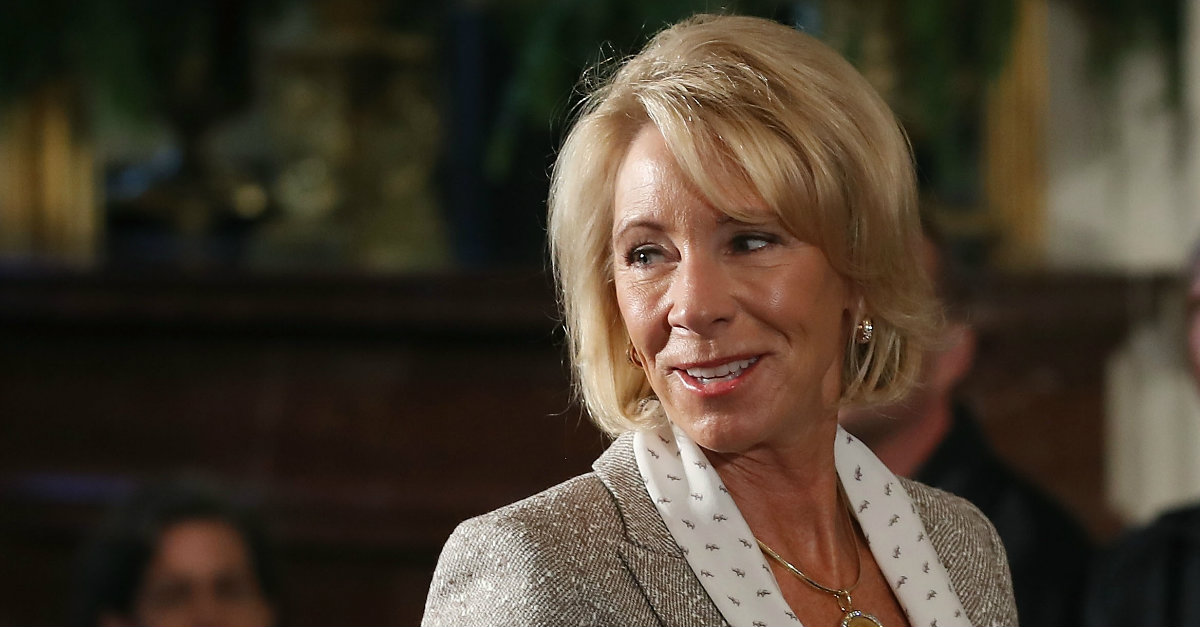
Betsy DeVos is at it again, bungling who gets congressionally appropriated funds from the CARES Act. This is getting tiring, really. We’ve already seen the Treasury Department try to distribute CARES money to corporations instead of Indian Tribes, and now the Department of Education (DOE) is trying to keep DACA recipients from getting money earmarked for college students.
Congress appropriated $14 billion to higher education in a Higher Education Emergency Relief Fund (HEERF). DeVos was supposed to allocate $12.6 billion of that money to institutions using a formula provided by Congress. Each school was to give half of its money to students as emergency grant aid and use the other half however it deemed useful. Under the CARES Act language, higher education institutions are to use HEERF Assistance to “cover any costs associated with significant changes to the delivery of instruction due to the coronavirus.”
Congress had only two restrictions on students getting this money: those studying completely online weren’t entitled to any grants, and those attending part-time should get less than those attending full-time. Seems reasonable.
DeVos, however, decided to put her own spin on the rules. She decided that to be eligible for CARES funding, students also must be eligible for federal Title IV student financial aid. That means, DACA recipients and other undocumented students, temporary Protected Status recipients, and asylum applicants are all ineligible. A few other categories of students would be excluded too: those who are dually-enrolled in high school and college, those who are in default on a federal student loan, those who fail to keep up with academic standards, and those enrolled as non-credit students.
The DOE’s spokesperson made clear in a statement, though, that DeVos’s guidance was informed by concerns about students’ immigration status saying, “the CARES Act makes clear that this taxpayer funded relief fund should be targeted to US citizens, which is consistently echoed throughout this law.”
Now’s probably a good time to point out that DACA recipients are taxpayers.
In response to DeVos’s efforts to bring the DOE in line with the Trump administration’s anti-immigration policies, the chancellor of California’s community colleges and five California college districts sued DeVos Monday for what they call “unlawful restrictions” on HERFF money. DeVos’ unilateral decision to restrict funding flies in the face of separation of powers, the complaint argues; Congress set out the parameters it wanted, and the DOE’s changing the rules amounts to an illegal exercise of legislative function by the executive branch.
In their complaint, the plaintiffs not only call out the DOE’s Title IV restrictions as illegal, but also slam the DOE for being part of the problem instead of part of the solution during an already-difficult time:
The DoE’s confusing and conflicting guidances regarding student eligibility has placed a significant administrative burden on Plaintiff Districts’ financial aid offices, in a time when staff is working remotely and without access to resources available in their offices.
The DOE’s guidance on CARES funding functions to exclude more than 800,000 students in California alone. Given the difficulty Betsy DeVos appears to be having with following rules on CARES funding, perhaps she should focus on doing her job instead of trying to do Congress’s.
[image via Mark Wilson/Getty Images]
This is an opinion piece. The views expressed in this article are those of just the author.